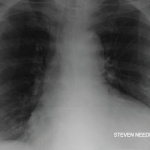Patients with acute pericarditis who are treated with colchicine in combination with a traditional antiinflammatory therapy experience a significantly reduced rate of incessant or recurrent pericarditis.
Massimo Imazio, MD, of Maria Vittoria Hospital in Turin, Italy, and colleagues published the results of the Investigation on Colchicine for Acute Pericarditis (ICAP) trial in The New England Journal of Medicine.1 The multicenter, double-blind trial included adults with idiopathic/viral pericarditis, postpericardiotomy syndromes, and pericarditis related to a systemic inflammatory disease. Patients were included with their first episode of acute pericarditis, but excluded if they had elevated levels of aminotransferases, creatinine, or troponin.
Patients were randomly assigned to receive three months of traditional antiinflammatory therapy plus either colchicine (0.5 mg twice daily for patients weighing >70 kg or 0.5 mg once daily for patients weighing ≤70 kg) or placebo. The majority of the patients in the study were treated with aspirin and a small percentage received ibuprofen.
The primary study outcome was incessant or recurrent pericarditis. Patients were followed for an average of 22 months (minimum 18 months). In the colchicine group, 16.7% of patients were diagnosed with incessant or recurrent pericarditis, whereas 37.5% of patients in the control group received the diagnosis (p <0.001). This translated into a relative risk reduction of 0.56 in the colchicine group and a number needed to treat of four.
The European Society of Cardiology guidelines on pericardial disease recommend colchicine as a first-line treatment for recurrent pericarditis (class I indication). In contrast, a class IIa indication was given for the use of colchicine to treat an initial attack of acute pericarditis. The difference in recommendation reflected a lack of clinical trials specific for an initial attack of acute pericarditis.
“Of note, colchicine is not approved for the prevention of recurrent pericarditis in North America or Europe, and its use as such is off label,” wrote Dr. Imazio in an e-mail to The Rheumatologist.
Current guidelines recommend that colchicine be dosed at 2 mg/day for one to two days followed by a maintenance dose of 1 mg/day. The optimal treatment dose for colchicine has not yet been determined, however. Lower dosages (such as those described in this study) may be just as effective as the higher dosages and have the added benefit of improved patient compliance. Dr. Imazio speculated that longer treatments (>3 months) may also result in greater benefits.
“Most treatments are empirical in the setting of pericarditis. At present, colchicine is the most studied drug in this field, and we have enough evidence (an open label randomized trial, the COPE [Colchicine for Acute Pericarditis] trial, and a multicenter double-blind randomized trial [the present ICAP study]), in my view, to support its use in acute pericarditis (first episode) as well as for the first recurrence of pericarditis after the index attack as supported by the previously published CORP [Colchicine for Recurrent Pericarditis] trial,” wrote Dr. Imazio in an e-mail.


